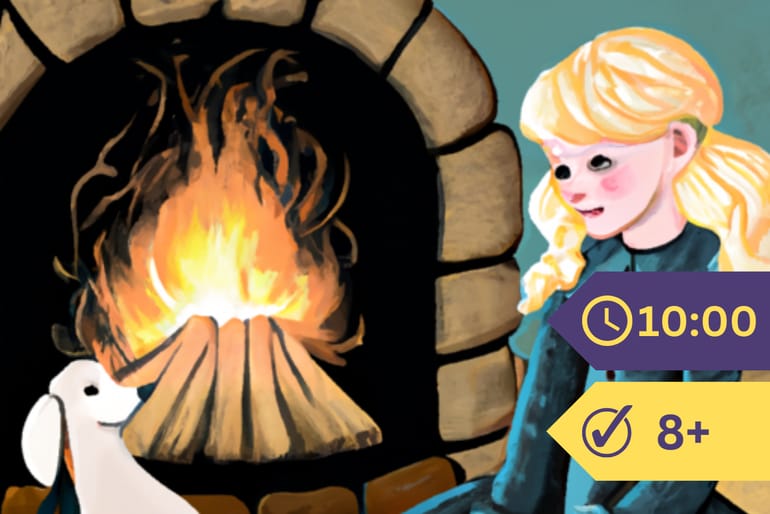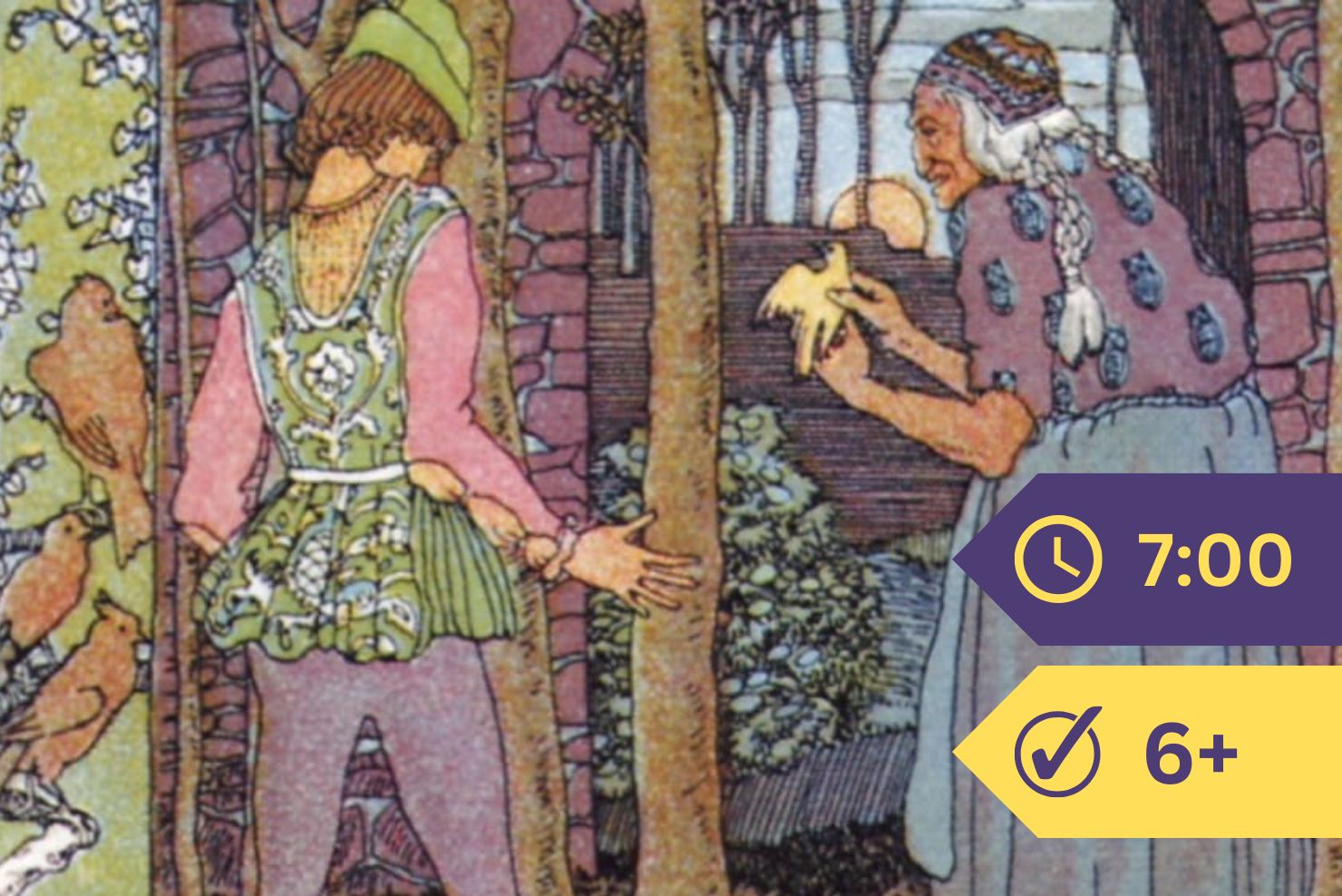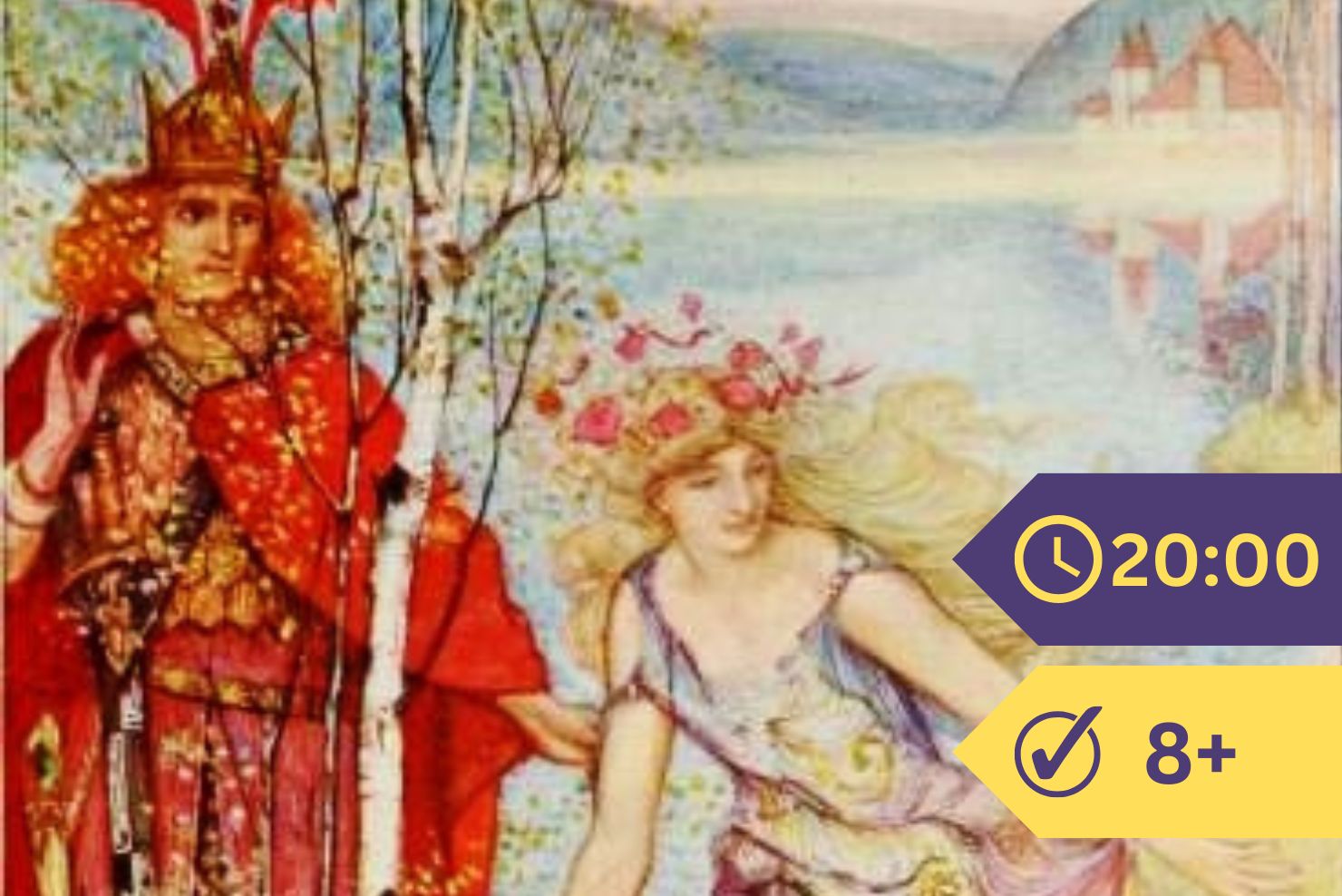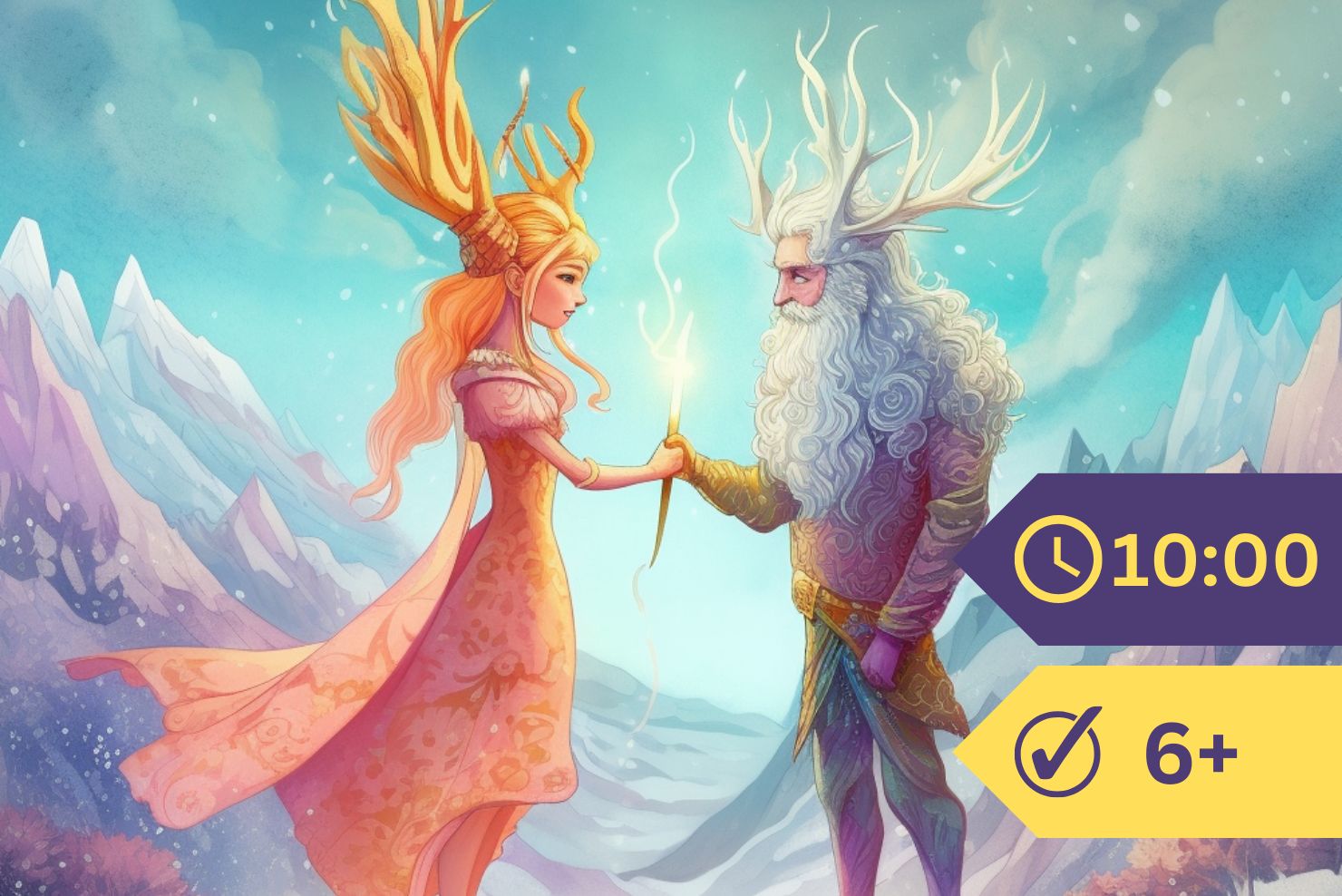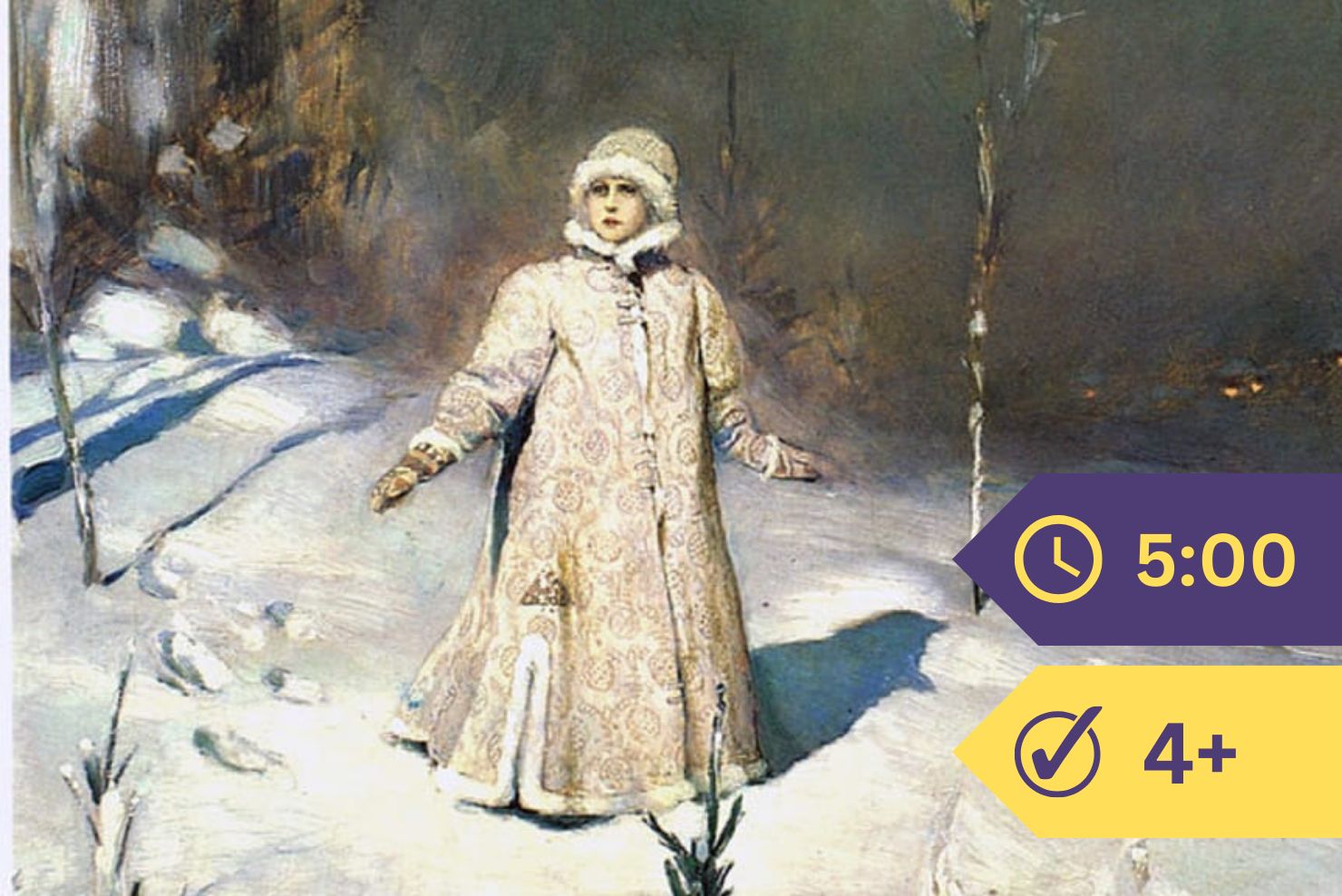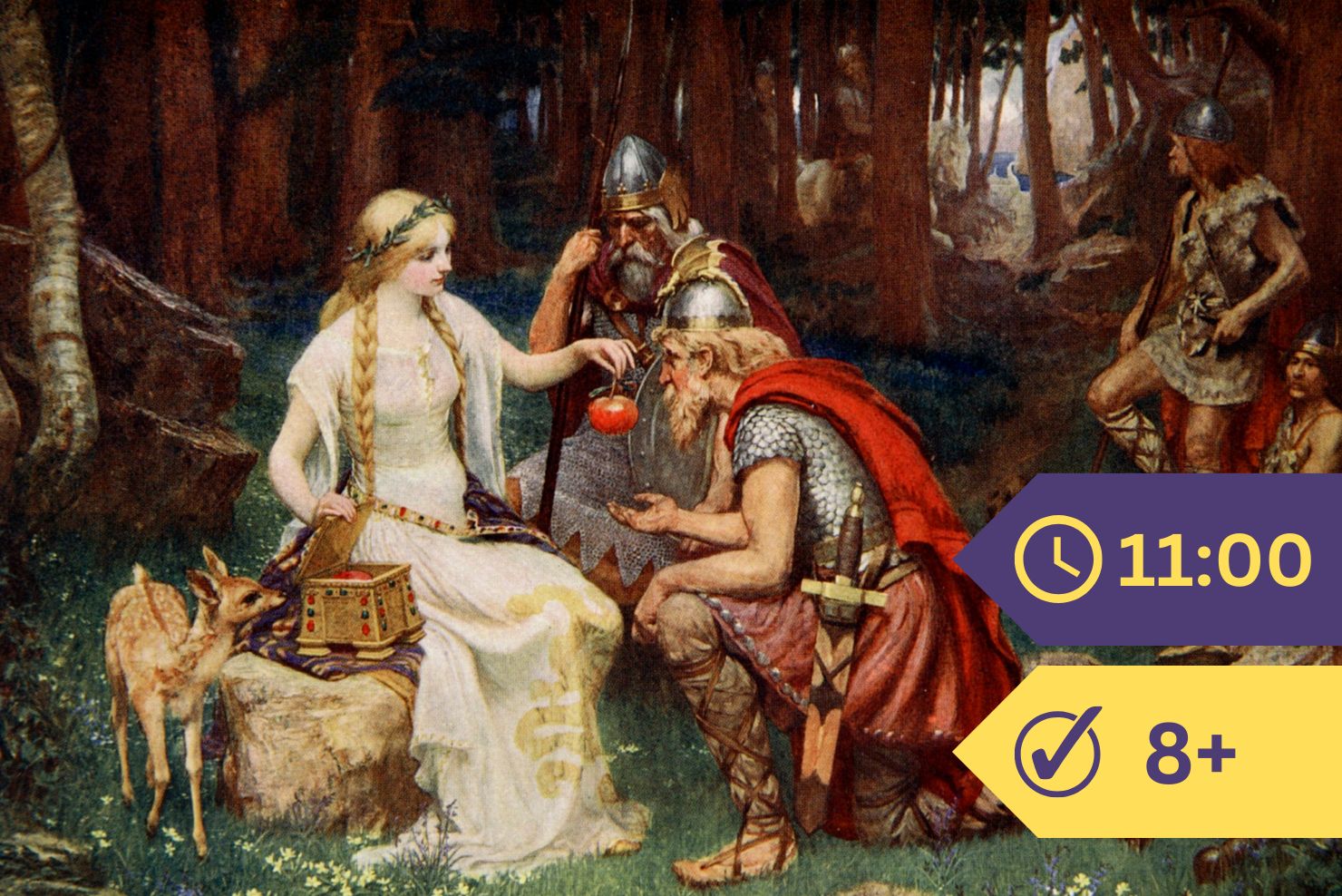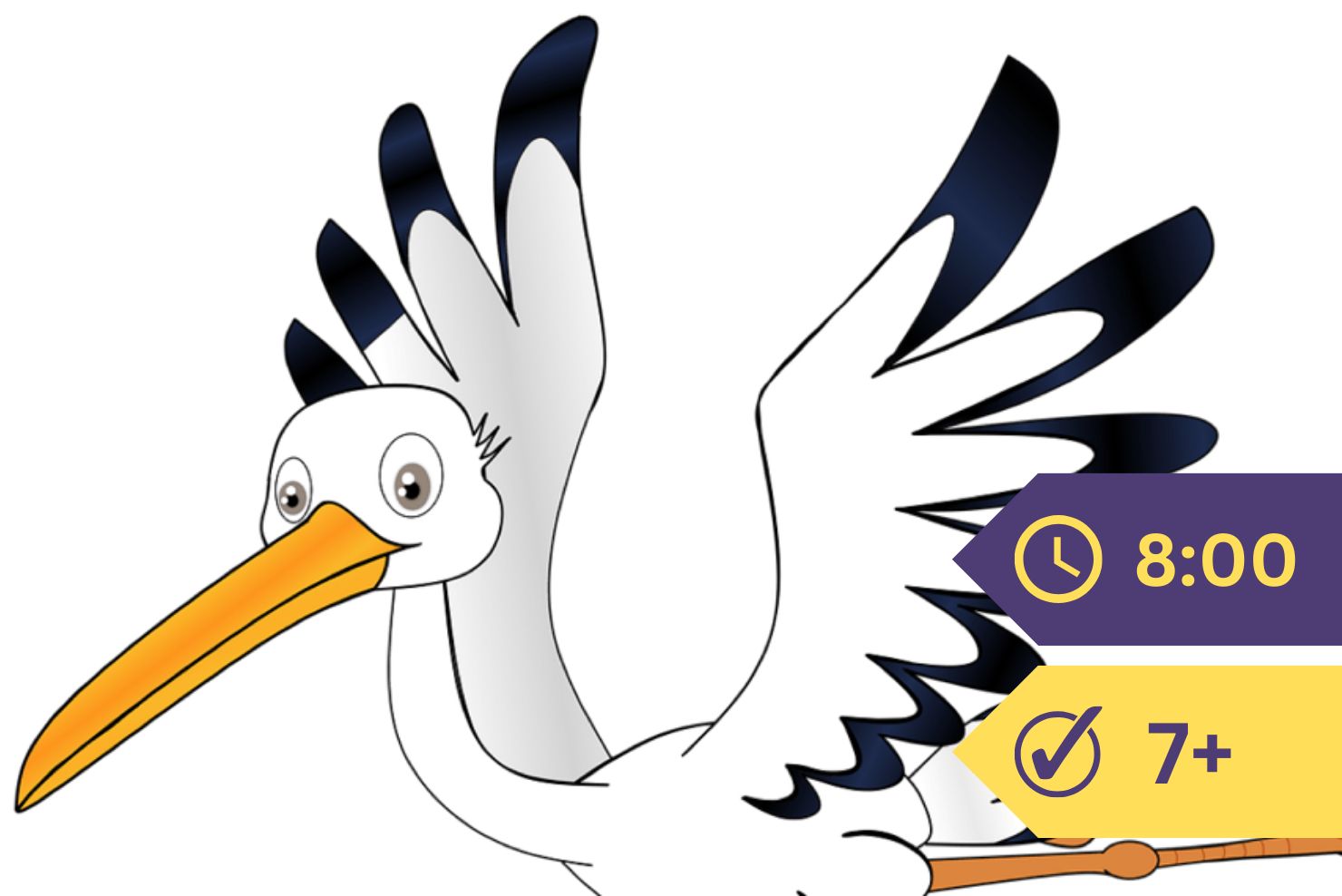The mists of the early twilight were falling, and Elsa, the little girl who lived at the woodman’s cottage, was still far from home. She had wandered out in the spring sunshine in search of the bluebells and wild anemones, for the child loved the company of the birds and flowers better than the rough play of her brothers.
The woodman and his wife said she was strange and dreamy and they didn’t understand her interests, but they were not Elsa’s real parents. They were kind to her, however, and Elsa always tried to listen to them; but sometimes she forgot. She had forgotten today— her foster mother had told her to remain near the cottage, but the eagerness of her search for the flowers she loved had led her farther into the wood than she had ever been before.
The sunlight disappeared, and the darkness seemed to come quite suddenly under the thick branches of the trees; the birds had chanted their last evening song and gone to their nests—only a solitary thrush sang loudly just overhead; Elsa thought it was warning her to hurry homewards. She walked quickly in the direction, of what she thought, was her cottage, but she was barely seven years old, and felt a little frightened, so it is not surprising that she only plunged deeper into the wood.
Now she found herself in the midst of a great silence. The stars looked friendly, and she was glad to see them, but it was growing dreadfully cold. The plucked flowers withered and fell from her poor little numbed hands, and she shivered in her thin cotton dress.
Ah! What would she not have given for a sight of the open door and the fire in the woodman’s cottage, and some warm bread and milk, even though it was given with a scolding from the woodman’s wife! She struggled on, with her poor little tired feet, because it seemed to her that the wood was growing thinner—perhaps there might be a house nearby.
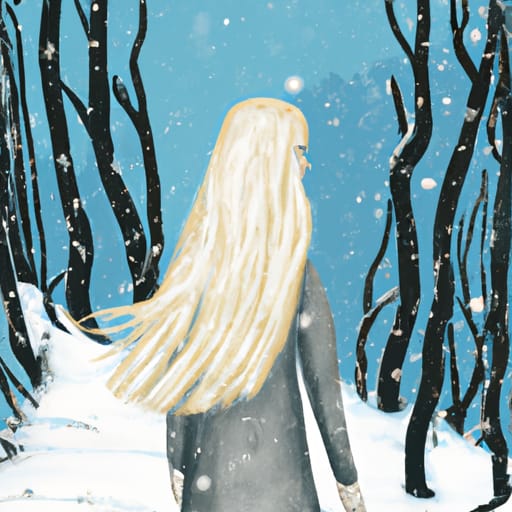
It was terribly cold. Now there was frost upon the ground at her feet. The moon had risen, and she could see that all the world around her was white and chill.
It was strange that she had strength to go on, but she looked up at the stars, and thought that they were guiding her. Finally she came to the border of the wood, and there stretched before her a wide, open space, with only a few trees scattered here and there, and through an opening of the trees the cold moon shone down upon a white, silent house.
The house looked as dead and winter-bound as everything else; but still it was a house, and Elsa said to herself that surely someone must live in it. So she thanked the friendly stars for leading her, and with what remaining strength she had, dragged her poor little numbed feet up the broad path between the trees. At the end of the road an iron gate hung open upon its hinges, and Elsa found herself in what once had been a garden. Now the lawns and flower-beds were all alike one blinding sheet of ice and frozen snow.
But there was the great white house, and from one window shone a light, surely the light of a fire. All the rest was dark. Up a flight of stone steps the child dragged her weary feet, until she stood before a huge door, brown and black, closed and barred with iron bars. The great knocker hung high above her reach; but with her poor little hands she beat against the woodwork. Surely, if someone did not let her in soon, she must fall down there and sleep and die upon the step. But at the sound of her faint knocking, a dog started barking, and Elsa was terrified, but could not run away; then in a few moments the great door opened slowly.
A tall man, dressed like a hunter, pale-faced in the moonlight, but strong and powerful, and wearing a long, dark beard that reached almost to his waist stood in the door. He would have frightened any child, but Elsa saw only the scene behind him. A great blazing wood fire upon an open hearth, with rugs in front of it with two large dogs laying on them; a third dog had followed his master to the door. Elsa stretched out her little hands to the blazing warmth.
“Please let me come in!” She pleaded.
The man lifted her in his arms, and laid her gently down on the rugs in the warmth, and the dogs sniffed round her and seemed to welcome her—and—for a little while she remembered no more.
When Elsa came to herself, she found that she was laying on soft cushions on the rug.
The rough-looking man with the long, dark beard and the pale face knelt beside her, holding a bowl of warm, steaming broth. Then Elsa sat up and tried to drink, but she was so tired and cold that her new friend had to feed her with a spoon, which he did awkwardly. After she had eaten the broth, she sank into a deep, sweet sleep.
When Elsa once more opened her eyes, the cold grey light of morning fell through the uncurtained windows into the hall. She found herself lying on a couch covered with rugs of warm fur, at the side of the hearth, where logs of pine wood, newly kindled, leapt and blazed, filling the air with sweet, pungent odours.
For a while she was bewildered, wondering how she came to be there, instead of in her little room at the woodman’s cottage. Then she saw her friend of the night before kneeling in front of the fire, preparing food. Then Elsa remembered; and she clapped her hands with a merry laugh, the laugh of a happy, waking child.
“I want to get up,” said Elsa.
“Wait a few minutes, little lady.”
Then he led her to a small room, which was a bit strange. There was a table with brushes made of silver; a little pair of satin shoes had been thrown carelessly upon the floor; a cloak of crimson satin was flung over a chair. All these things looked as though a hand had cast them aside yesterday—yet all were faded and dirty, and the dust lay thick as though that yesterday had been many years ago. But Elsa got ready and returned to have breakfast.
When the meal was over, Elsa asked if she could help around the house. And she started to wash the dishes. From that day a strange new life began for little Elsa.
The rough-looking man who had given her shelter seemed to be living alone with his dogs. Every morning he went out with them and his gun, to hunt in the forest. In the garden grew corn and other vegetables and fruits and the man had goats for milk and chickens for eggs.
Elsa wasn’t planning on returning to her foster parents. She was terrified at the thought of being lost in the wood again, and pleaded hard to remain with her new friend. He had grown fond of her and was happy for her to stay.
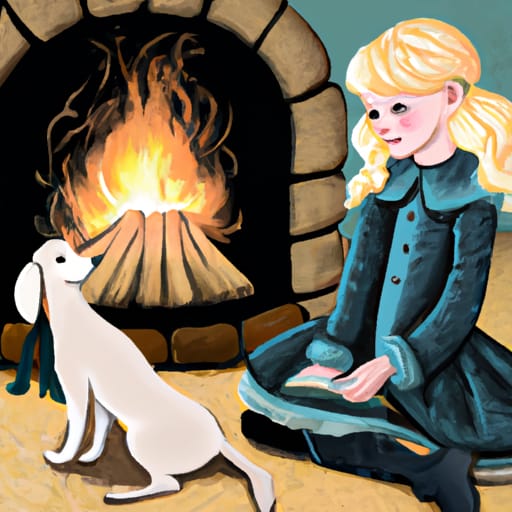
While Ulric, as the man was called, was out hunting, Elsa did household chores, practiced with needle and thread and cooked dinner. After dinner they would sit by the fire and Ulric would tell her strange stories or read aloud to her from books from his library.
In the evenings Ulric taught her many things: to read and to write, and even to speak in other languages. He let her wander around the mansion, dust was thick everywhere, and soon Elsa grew to understand that the dust must remain; no hand was allowed to touch anything in that strange, silent house beyond the hall and the little room which Ulric had arranged as her bedroom. However, there was one part of the mansion she never went to. At the end of a long passage hung a heavy velvet curtain, and behind this was a door, always securely locked. Only Ulric sometimes went there and when he returned from these visits he was sad for many hours.
Weeks slipped into months. Every day Elsa looked forward for spring to arrive. But the spring never came. The bitter cold and the frost continued, and in time the child’s heart froze too, except for the strong, warm love she had for Ulric.
Elsa often wondered about the mystery that shadowed his and her life, but she never thought of leaving. It would break Ulric’s and her heart. And the months grew to years, and Elsa was twelve years old. Then one evening Ulric came in from one of his visits to the closed room, more sad and thoughtful than usual, and he took Elsa’s hand and started to speak.
“Little Elsa,” he said, “I have counted the time, and it is now five years since you came to me. You told me then you were seven years old, now you are twelve, and will soon be growing into a young woman. The time has come——”
“Not for me to leave, father?”
“That is for you to decide”
“Then it is settled,” said Elsa, trying to laugh, “for I will never leave you.”
Something like a light of hope shone in the man’s clouded eyes—eyes in which Elsa had never seen a smile, although his lips had smiled at her often.
“Listen,” he said; “before you decide, I must tell you all.”
“It is a little more than eleven years since the curse fell upon me. I was a hard man then, Elsa—hard and cruel and strong—it was my boast that I never forgave a debt, or pardoned an enemy. I had married a young and beautiful wife, and I loved her passionately, but in my own hard and selfish fashion. We had one child—a girl—then only a few months old. It was a New Year’s Eve that I decided to host a big party for my own ego. Every one invited came to my ball. We were drinking, here in this hall, when we heard a cry. It was a child in pain. It rings in my heart still. My wife opened the door. On the step was a woman, with a child in her arms. A man, gaunt and hunger-stricken, towered behind her in the darkness; two other children clung to her, shivering and weeping. We were in the midst of the cruel, bitter winter; the earth was frost-bound, hard and cold. That day I had given orders that these people, poor and starving as they were, should be evicted from their home. The man I suspected of being a poacher, and he was doing no work—a good-for-nothing—but my wife, had pleaded that I would wait, at least, until the summer. Now she bent down to that poor creature on the step, who was trying to nurse and warm her babe in her chill arms, and whispered something—I guessed it was a promise of shelter. One by one, my guests left. In my pride and anger I closed the door and barred it. A voice rose in the still night air—the sound of a bitter curse—a curse that would rest upon me and mine, the chill of winter and of death, of pitiless desolation and remorse, until human love should win me back to human pity and forgiveness. In the morning the curse had fallen. The woman and baby I had turned away had been found at my gates, dead. The servants fled and left me alone, taking with them our child; my wife died too.”
The man’s head drooped upon his hands. For a moment there was silence in the hall. Elsa stood—her child’s heart grieved at the terrible story.
Ulric recovered himself and continued: “Now, Elsa, you know all. My child, if you will return to the world and leave me to work out my fate, you shall not go penniless. I have wealth. I will find you a safe home, then—I will try to forget.”
“Father, dear father, I love you—you are sorry—I will not leave you—do not send me away.”
A few minutes later he led her to the closed room. Together they went in and Elsa found herself standing in a richly furnished room.
Near a window was a couch covered with dark velvet, and upon the couch a figure lay stretched as if in quiet, death-like sleep, or carved in marble. The figure was that of a young and beautiful woman. Her dress of white satin had yellowed with time; her golden hair lay on the pillow.
“It is fitting now,” said Ulric, “that you should come here.”
“Mother, awake!” she said. “Mother!”
Slowly the dark eyes opened and rested with a look of love upon Elsa’s face.
And so the curse and the shadows of eternal winter passed away from the house of Ulric, and his wife came back from her long slumber. In due time the garden, too, awoke to the touch of spring, and the flowers bloomed, and the birds sang in budding trees, and the sun shone. And Elsa’s love grew deeper and deeper for her father and mother; for perhaps you have been clever enough to find out that the woodman’s wife was the servant who had carried away with her in her flight Ulric’s little daughter on the night of the New Year’s ball.

